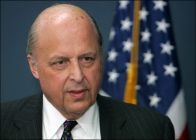US, Nigeria discuss Darfur force deployment
November 12, 2007 (ABUJA) — US Deputy Secretary of State John Negroponte and Nigeria’s Foreign Minister Ojo Maduekwe on Monday discussed the importance of a rapid deployment of the United Nations-African Union hybrid force to Sudan’s troubled Darfur region.

“We agree with the US… on the need to expand the force in Darfur, but we also feel the need to hear out the president of Sudan as to what are his fears and concerns,” Maduekwe said.
An ill-equipped AU force of under 7,000 troops currently deployed in Darfur has failed to end the bloodshed that has left around 200,000 people dead in the region from the combined effect of conflict and famine since 2003.
The AU force is to be replaced by a 26,000-strong, joint UN-AU force, which is not expected to be fully deployed until some time next year.
Negroponte, a career diplomat and from 2005 until February this year the first US director of national intelligence, later held talks with Nigerian President Umaru Yar’Adua on ways to boost bilateral ties.
“We talked about a wide range of issues, the US/Nigeria bilateral relationship, our common interest in regional peace and stability and the role of Nigeria in international peace keeping operations as well as the president’s agenda for reform,” Negroponte told reporters after the meeting with Yar’Adua.
Negroponte, who was accompanied on the trip by US Assistant Secretary of State for Africa Jendayi Frazer, said the talks specifically touched on the crises in Darfur, Somalia and other flash points on the continent but declined to give details.
Maduekwe said his meeting with Negroponte focused on Nigeria’s position on proposed UN Security Council reforms, on which African nations are vying for a permanent seat, and on how Nigeria can benefit more from US investment in the country.
He said Nigeria, whose economy is oil-based, is not getting enough out of US economic policy under the African Growth and Opportunity Act (AGOA), which deals mostly with non-oil based exports.
He therefore suggested a review of that policy to make it reflect the dynamics of the Nigerian economy.
(AFP)
